
Champa Chettri, a 20-year-old resident of the Margherita town in the Tinsukia district of Assam, went missing on 28 April.
Her family raised an alarm after she failed to return from the beauty parlour where she used to work. Days later, local boys spotted an object floating in the Dihing River near Lama Gaon and informed the police.
On 3 May, Chettri's charred and decomposed body was recovered from the river. It was found that Chetri had been kidnapped and raped, after which an unsuccessful attempt was made to burn her body before it was dumped into the river.
According to reports in Assam media, the police have arrested two youths - Biswajit Chettri and Moinul Ali of Ledo region. They have been charged under sections 366,376 and 342/34 of the IPC.
Also Read: #JusticeForJisha: Kerala police register FIR for rape and murder
Where is the national media?
The case has created ripples across Assam, where a number of candlelight marches and protests have been taken out against demanding strict action against the accused. The All Assam Gorkha Students' Union (Union) also called for a 12-hour shutdown in Tinsukia district to protest the incident.
Also read: Bengaluru woman escapes rape attempt after being abducted from outside her PG
The incident has also sparked a debate around the coverage received by the North-East region in the national media.
Incidentally, a 30-year-old Dalit student of law from Kerala was found raped and murdered in her home in Perumbavoor in Ernakulam. The case received national attention, with many calling the victim Kerala's Nirbhaya.
In an eerie similarity, both cases received national media coverage and police scrutiny only days after the crimes occurred.
While speaking to Catch, Nanda Kirati Diwan, social activist and Central Executive Member All Assam Gorkha Students' Union said, "This is the rarest of the rare crimes still there has been no coverage around it in the national media."
"This is also reflective of the negligence which the North-East region has been facing in general as far as the media coverage is concerned. Take the example of the furious floods or the rhino poaching- have these issues received aequate coverage?," asks Diwan.
'Heinous crimes need strict laws'
In a thought-provoking letter addressed to Prime Minister Narendra Modi, Rakesh Furba Sherpa, President, Tinsukia Regional Committee at All Assam Gorkha Students Union writes -
"बेड़ी ही दु��- की बात हैं प्रधान मंत्री महोदय जी, जो घटना निर्भया के साथ हुई थी, वही घटना आज फिर ��...सम के एक युवती के साथ हुई ।" (It is sad that the 2012 Nirbhaya case has been repeated in Assam.)
Commenting on the loopholes in the security system for the women and in our country, Sherpa writes, "मुझे ल��--ता हैं २ वर्ष की कार्यकाल में विदेश जाकर महिला��" के सुरक्षा के प्रति आपने न तो किसी भी प्रकार की ��...ध्ययन कियें ��"र ना ही ईसमें आपको कोई रुचि हैं ।" (I don't think you've learned anything about laws for women's safety despite all your foreign trips in the last two years)
(The full letter is at the end of the story)
While Sherpa's words have been fueled by outrage over the incident, Diwan also warned about the lack of an adequate legal mechanism to deal with perpetrators of such heinous crimes.
"A brutal crime like this should be reciprocated nothing less than a death penalty. Further they cases should be put on a fast-track court so that the victims or tehri families do not have to wait for years for justice," says Diwan.
He suggested that an electronic directory be set up to monitor the movements of the accused in rape and murder cases.
Meanwhile, activists - including Diwan and Sherpa - are now demanding for proper compensation for Chettri's family. The activists have also demanded that the case be heard in the higher court so that the accused could be punished without any delay.

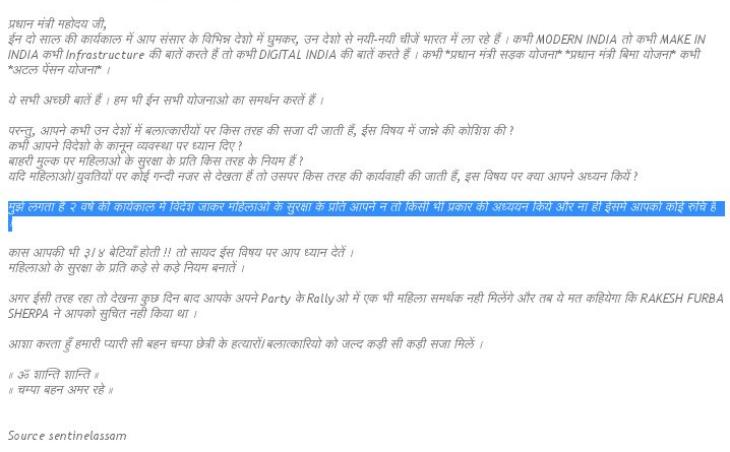



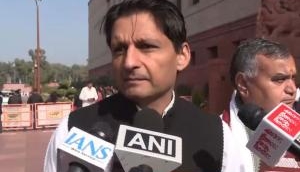
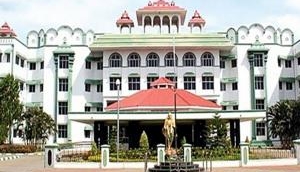

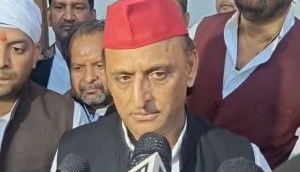
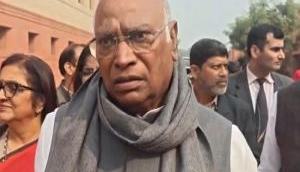
![BJP's Kapil Mishra recreates Shankar Mahadevan’s ‘Breathless’ song to highlight Delhi pollution [WATCH] BJP's Kapil Mishra recreates Shankar Mahadevan’s ‘Breathless’ song to highlight Delhi pollution [WATCH]](https://images.catchnews.com/upload/2022/11/03/kapil-mishra_240884_300x172.png)

![Anupam Kher shares pictures of his toned body on 67th birthday [MUST SEE] Anupam Kher shares pictures of his toned body on 67th birthday [MUST SEE]](https://images.catchnews.com/upload/2022/03/07/Anupam_kher_231145_300x172.jpg)






